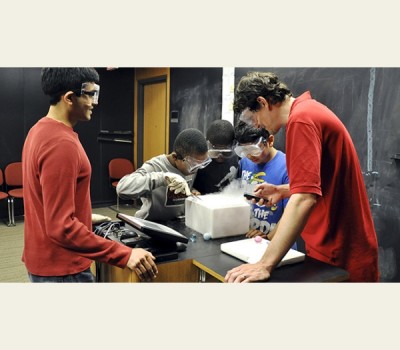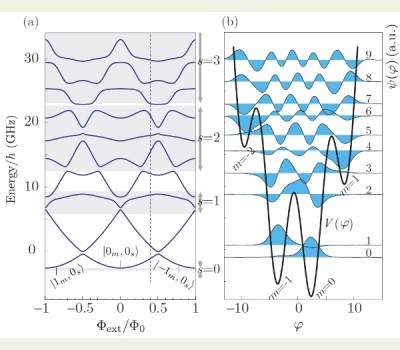The field trip involved middle school students from Chicago. An article by Northwestern’s Science in Society covering the outreach event can be found here . More photos showing the event can also be found on Science in Society’s Facebook page.
Blogroll
Phys. Rev. B article on Asymptotic expressions for charge-matrix elements of the fluxonium circuit
In charge-coupled circuit QED systems, transition amplitudes and dispersive shifts are governed by the matrix elements of the charge operator. For the fluxonium circuit, these matrix elements are not limited to nearest-neighbor energy levels and are conveniently tunable by magnetic flux. Previously, their values were largely obtained numerically. Here, we present analytical expressions for the […]
Physical Review X paper on Fluxonium Symmetries published
Quantum circuits present a powerful framework for achieving new functionality by combining circuit elements into larger networks. However achieving quantitative modeling of large quantum circuits such as fluxonium, is hampered by non-linearity, interactions and a large number of degrees of freedom. In our paper we make use of approximate Unitary and Symmetric group symmetries to […]
New Phys. Rev. B article on Fluxonium Qubits in the Dispersive Regime
In circuit QED, protocols for quantum gates and readout of superconducting qubits often rely on the dispersive regime, reached when the qubit-photon detuning $Delta$ is large compared to their mutual coupling strength. For qubits including the Cooper-pair box and transmon, selection rules dramatically restrict the contributions to dispersive level shifts $chi$. By contrast, without […]
Houck Lab: First Resonator Arrays
The Houck Lab at Princeton has recently fabricated and characterized the first microwave resonator arrays. The selected array geometry consists of 12 coplanar waveguide resonators, coupled by three-way capacitors to form a Kagome star. The successful reduction of disorder in resonator frequencies to as little as a few parts in 104 paves the way for […]
New Nature Physics Progress Article on Quantum Simulation
Check out the latest review article on “On-chip quantum simulation with superconducting circuits” in the April edition of Nature Physics. Link: Nature Physics paper.
TED talk by Scott Aaronson
A recent TED talk gives the most entertaining 15-minute whirlwind tour of quantum computation. – Scott Aaronson (Professor at MIT) not only explains what quantum computation is, and why we are excited about it, but he also makes the case that research in this direction could lead to substantial progress in understanding quantum mechanics itself. […]
Peek at Quantum Physics for Laypeople
Why Quantum Physics is Weird – and Stunningly Useful

